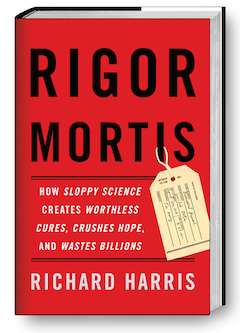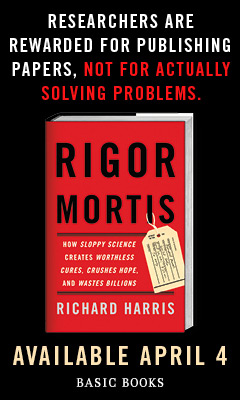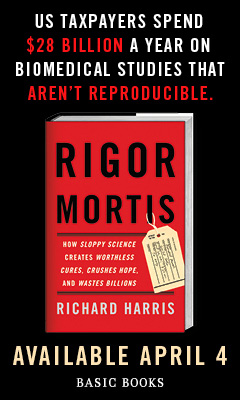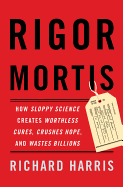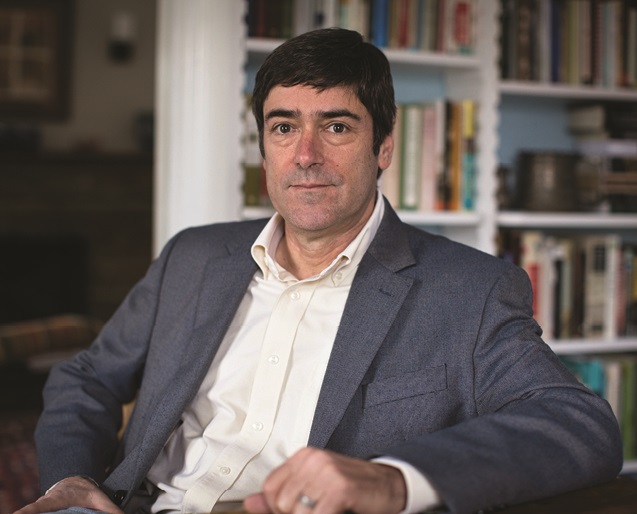Rigor Mortis: How Sloppy Science Creates Worthless Cures, Crushes Hope, and Wastes Billions
by Richard F. Harris
Richard Harris, a science reporter for National Public Radio (NPR), presents a fascinating, thoroughly researched exploration of the advances, traps and pitfalls of biomedical science in Rigor Mortis: How Sloppy Science Creates Worthless Cures, Crushes Hope, and Wastes Billions.Harris pairs statistics, contemporary and historical facts, interviews and personal stories from influential scientists in academia and private labs with accounts of patients facing illnesses and the rigmarole of medical trials to add a human dimension to the scientific aspects. This all works together to shine a bright light on the limitations and politics of modern biomedical research, which largely boils down to problems with investments and pressures of time, professional reputation and money.
The book begins by extolling some of the astounding strides made in medicine. This includes the deciphering of the human genome, our genetic blueprint, and how it has afforded greater insights and technology for research labs, which can now readily access information relating to diagnoses, treatments and cures of illness and disease. Antibiotics, drugs designed for specific infirmities, vaccines and heart surgery have increased life expectancy while also deepening the pool of finances allotted to scientific research. Harris notes that "the average American household spends $900 a year to support biomedical studies." Some of that is money baked into the price of costly prescription drugs and medical treatments, as pursuing biomedical goals is expensive, and federal funding is actually shrinking.
The rate of new drug development and approval has been falling since the 1950s. Yet, each year, more than a million biomedical studies are published in scientific literature. Research, however, has proven that "many of them are simply wrong." It's this hypothesis that sets up Harris's well-constructed narrative that demonstrates how, when an "exciting scientific discovery is reported, scientists are often quick to jump on the bandwagon without considering whether the original finding is in fact true."
In 10 well-drawn chapters, Harris documents flaws in the medical research process and how it has "gone astray, as perverse incentives discourage scientists from following the rigorous path of top-quality science." The culture has become such that scientists are often forced to choose between doing what is right and what is necessary to keep their labs and their careers afloat.
The work of C. Glenn Begley emerges as a cornerstone of Harris's reporting. Begley, an Australian-born scientist, left academia after 25 years to work for Amgen, a Southern California cancer research biotech company. Begley and his staff set out to find hopeful preclinical research that might spark new cancer drugs. After combing through a trove of experiments and data that could lead to groundbreaking new medicines, Begley asked Amgen scientists to repeat documented experiments to ensure they would come up with the same results put forth in the literature. He soon discovered that most of the time, Amgen labs could not replicate those successes.
Every dead-end report was filed away by Begley. And before he left the company, he resurrected the most promising leads, selecting 53 papers. This time, he asked the scientists who first published the reports to provide more information. Amgen then set out to reproduce the data with that exact material. If they failed, Amgen went one step further, and sent its own scientists to labs to witness how the original experiments were executed. Alarmingly, only six labs--or one out of 10--could reproduce the results.
This sobering discovery was published by Begley and an associate in 2012. The report spelled out the problem in stark terms, indicating a reproducibility crisis in biomedicine and warning that widely cited work and preclinical data, often marred with errors, missteps and red herrings, was published anyway due to pressure on scientists who feared that funding might be pulled from long-term projects.
Begley expected the report to serve as a "shot across the bow" that would change biomedical culture and open a healthy discussion. Instead, it was met with fierce opposition and skepticism from within the biomedical community. The report itself--and the aftermath of bringing such glaring shortcomings public--sets the foundation for all that follows in Rigor Mortis. Harris utilizes Begley's findings as a launchpad to dissect the scope of faulty methods, dubious technology, perverse incentives and the reasons why scientists don't always dig deep enough to ensure that studies are actually true.
Harris offers detailed supporting data and examples surrounding problems in the areas of funding, grants, publication and fame. He expounds upon the politics and intellectual tug-of-wars of biomedical science in academia and in the pharmaceutical industry, along with the many problems inherent in scientific training, integrity and the challenge of practicing "precision medicine." He explains the role of the F.D.A., federal guidelines and data sharing, along with the ways in which the biomedical industry manages failure and misconduct, algorithms and statistics on the road to forming conclusions. Harris concludes by aiming his focus on the efforts of the scientific community to seriously weigh and consider Begley's report. He emphasizes a need to raise standards of biomedical practice to improve the reliability of clinical research and data.
Embedded throughout this scientific exposé are patient case studies. Harris paints clear portraits that demonstrate how biomedical science filters down to the ill and infirm and those who love them. The personal stories about people caught in healthcare quagmires and the defects of the clinical trial industry add an emotional subtext that fleshes out the well-presented scientific analysis. These case histories will hold appeal for readers who are scientists, as well as laypeople searching to better understand the far-reaching consequences of biomedicine and its effect on humanity.
The plethora of information Harris presents is well-supported and makes a strong case, emphasizing the flaws embedded in the culture of biomedicine and the lack of transparency in the industry. Harris states, "The overarching goal of biomedical research is to understand the basic processes that lead to disease so that medical science can intervene to ease human suffering and improve health." Reading Rigor Mortis will help the biomedical community--and those affected by biomedical science--assess the state of the industry and make much-needed improvements that can benefit all. --Kathleen Gerard



